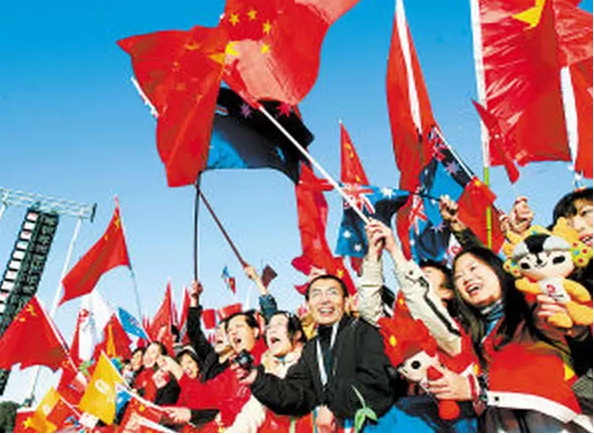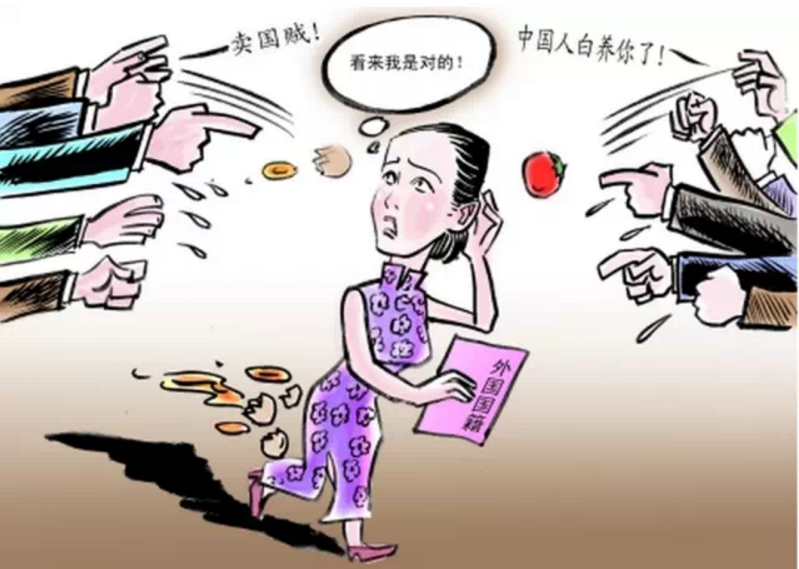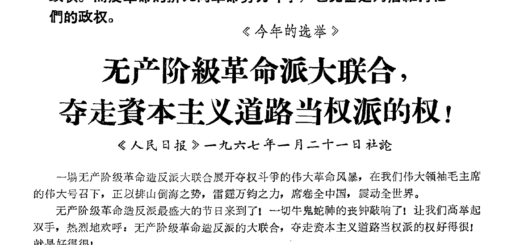Translation: “Don’t Be Naive: They’re Not Chinese”
By Geng Zhige, The Global Times, 3/26/2015 — Original
Do you know the difference between “Chinese people” and “ethnic Chinese?”
Chinese people are Chinese nationals.
“Ethnic Chinese” includes Chinese nationals and also includes those whose ancestral homeland is in China but have foreign citizenship.
So ethnic Chinese are not at all Chinese people, and as far as those who hold foreign citizenship or those who have sworn fealty to a foreign flag, they of course don’t have a duty to swear “allegiance” to China.
After all, modern society regards “nationality” as a legal idea. The idea of race nowadays is a kind of restrained feeling and isn’t in any way legally binding. With regards to overseas Chinese , they really don’t care about their own nationality so they are completely free. We don’t have the standing to hold them and their choices to the same standards as Chinese people.
In the world at large, this is all basic common sense knowledge. Perhaps due to the length of Chinese history and culture we are more used to using “ethnic groupings” to differentiate one another. Even unto today, some of our compatriots still like to think of “ethnic Chinese” as “Chinese people.” But this kind of attitude in our world will not work.
One recent example of this is the recently deceased “founding father” of Singapore, Lee Kuan Yew. Some of our compatriots think he promoted the reunification of Taiwan and Mainland China and assisted with reform and opening in the 1980s. They believe he is a kind of guy whose heart is oriented toward his homeland. Others of his countrymen point out, “don’t forget, although he is an ethnic Chinese person, he also made Singaporeans learn English and was always on guard against China. He is really a ‘banana,’ and Chinese people should not praise him!” These two kinds of responses are both a result of this – we still use “patriotism” as the standard to evaluate Singaporeans.
Lee Yuan Kew ancestral homeland indeed was in Guangdong, but he was never a Chinese person. As Singapore’s leader he was simply pragmatic, a lesson for post-reform China in how to conduct itself internationally. In the international environment of the 1960s and in terms of economic benefit, if Lee Yuan Kew always given priority to caring for China and its attitudes toward Singaporeans, there is no way that the pincer attack of English Control and Malaysian nationalist power could have been overcome. Singapore might have never reached the pinnacles of power it has reached today. Without Lee Yuan Kew’s cold-hearted political manipulation, Singapore could not have been as successful.
Overseas Chinese can have strong feelings for their country, but their thinking cannot be too simple. Just in South East Asia, there are a lot of difference between ethnic Chinese people. Although in Lee Kuan Yew’s Anglophilic Singapore, Malaysian Chinese persevere in teaching simplified Chinese. In Thailand and Indonesia there are plenty of old loyalists, and in Myanmar ethnic Chinese have endured regime change between many tyrants. In the past 100 years, the homeland has been too far and too weak to depend on. Assimilating or becoming independent were the only realistic choices.
On the world stage, some “ethnic Chinese” scientists have received some of the highest honors, others have performed exceptionally in athletics at the highest levels, and still others have made outstanding contributions in politics. All of these achievements are likely to make Chinese people proud. Although the success of the Chinese figures certainly promotes the impact of the Chinese race in every country, but the nationality of the people, after all, is not written on “China.”
In an age of peace, our wishful thinking and feelings are spent by basketball fans from whom the NBA profits. College are just wasting some old people’s pensions. The responsibilities and cost of law enforcement are increasing. But on the battlefield of government and military affairs mistakes are expensive. During the Korean war, there was once an ethnic Chinese US soldier who used his Chinese face to sneak into our army’s ranks. Once there, he helped the American army to win victory in a decisive battle. We can say that he was cunning and treacherous, but instead it should call attention to ourselves. He had an American passport, swore loyalty to the American flag, so he helped the American army defeat the Chinese army. It was his duty. Similarly, the name and the face of the American ambassador should not make you believe that he came back here to work in China’s interest.
In short, in our modern world the most reliable foundation for judging one’s identity is nationality and not one’s ancestral home. Our compatriots should understand ethnic Chinese people’s position and appreciate their accomplishments, but in the end treat them with a “business-like” mentality.
During China’s war of resistance against Japan, countless of exceptional Chinese people came back to the ancestral homeland to join troops, willing to give up their lives to fight in the war of resistance against Japan. In the new China, there is also a lot of outstanding scientific that has given up a comfortable life in the developed world to join the difficult work of modernizing China. Now, China doesn’t need pictures or catchy slogans to bring back its outstanding children from around the world. It can make all Chinese people realize the dream of the homeland. Only then can it arise in them lasting feelings of mutual profit and shared success. If in the future it is a foreigner who has no choice but to live in a Chinese world, should Chinese people worry about where his ancestors are from?
Original:
你知道“中国人”和“华人”的区别吗?
中国人,是拥有中国国籍的人。
而“华人”中,则既包括“拥有中国国籍的人”,也包括祖籍是中国,但拥有外国国籍的人。
所以,华人并不都是中国人,而对于那些持有外国国籍,曾在外国国旗下宣誓效忠的华人来说,他们当然也没有义务去“效忠”中国。
毕竟,现代社会更看重“国籍”这一法定概念。“种族”这一概念,如今只是一种情感上的羁绊,没有任何法定约束力。至于外籍华人们更在乎自己的根还是自己的国籍,那完全是他们自由,我们没有立场替他们做出选择,并以中国人的标准要求他们。
上面这些内容在世界上讲,应该是一种基本常识。可或许是由于中国的历史和文化过于悠久,我们更习惯用“族群”去区分彼此,直到今天,我们的一些同胞,还总是喜欢把“华人”简单地视作“中国人”。但是这种心态在世界上是行不通的。
一个最近的例子是,刚刚去世的新加坡的“国父”李光耀,一些国人,觉得他促进两岸统一,帮助大陆改革开放,就是一个心向祖国的自己人,另一些国人却指出:“别忘了,他虽然是个华人,却让新加坡人都学英语,还总是防着中国,所以他只是一个“黄香蕉”,中国人没必要抬举他!”这两种心态反应的都是一回事:我们依然用“爱国者”的标准在要求一个新加坡人。
李光耀祖籍确实是在广东,但他从来就不是一个中国人。作为新加坡的领袖,恰恰是李光耀用赤裸裸的政治实用主义,教给了改革开放后的中国怎么在国际上做人。在上世纪60年代的国际环境和经济利益实际情况下,一个处处优先照顾中国的利益,考虑中国人的感受的新加坡人,是无法在英国统治者和马来亚民族主义政权的夹击下登上新加坡政治权利巅峰的,没有李光耀看似冷酷无情的政治手腕,新加坡这个国家可能根本不会有今天的成就。
对外籍华人抱有亲近感可以,但是思维不能太过简单,仅仅东南亚,华人之间也有很大的区别,除了李光耀制下选择英美规则的新加坡人,还有自带干粮坚持简体汉字教育的马来西亚华人,在泰国印尼还有很多效忠前朝的后代,在缅甸则是自己就已经经历好几次改朝换代的土皇帝了。在过去的100多年里,祖国太远,实力太弱,根本谈不上什么依靠,选择融入当地或者自立为王,都是现实的选择。
在世界范围内,一些“华裔”科学家荣获科学方面的最高荣誉,或者在世界最高水平的赛场上表现优异,或者在政坛上出人头地,都容易让中国人动情。这些华裔人士的成就,确实提升了华人族群在所在国家的影响力,但人家的国籍上写着的终归不是“中国”……
和平年代,一厢情愿付出感情的代价可能仅仅是球迷被NBA多赚取点钱财,大学多浪费一些养老金,执法要承担更多的行政成本。但在政治和军事的战场上,代价就昂贵的多。朝鲜战争时期,曾有一位美军的华人士兵自称通过自己的华人面孔混入中国军队中,帮美军赢得了一次战斗的胜利。我们可以说他狡猾、奸诈,但更要提醒自己:他拿着的是美国护照,还曾在美国国旗下宣誓效忠,所以,他想尽办法帮助美军打赢中国,这是他的职责所在。同理,一名向你展示华人面孔和名字的美籍大使,也不要认为他是为了中国的利益才不远万里回到中国。
总之,在现代世界,判断一个人身份归属的最靠谱依据,只有国籍,而不是祖籍,国人对于华人的立场可以理解,对于华人的成就可以欣赏,但凡涉及利益,无需太多牵挂,只需要秉承“公事公办”的心态就好。
在抗日战争期间,有无数的优秀华人回到祖国加入抗战的队伍,甘愿付出生命;在新中国刚成立时期,也有大批优秀的科研人才放弃在发达国家舒适的生活,加入到艰苦卓绝的现代化建设事业中。如今,中国已经不需要救亡图存的口号来号召散落世界各地的优秀儿女,一个可以让所有中华儿女圆梦的家园,才能对他们产生持久正向双赢的向心力。如果将来是一个外国人都不得不选择中文的世界,我们还需要担心华人们是否会认祖归宗吗?



Recent Comments